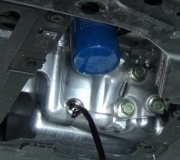In my opinion synthetic oil is not necessary unless specified by the manufacturer. (I am not going to tell you that I did not change the oil in my 1988 Grand Caravan in over 14 years, and when I added a quart about every 1,000 miles, I used the cheapest stuff I could find. I do not abuse my other cars that way and I do not want you to either).
The issue here is not what your engine is accustomed to. At issue is the additives in the oil. All oils today have "viscosity index improvers", detergents, seal conditioners, anti-foaming agents, dispersants, and anti-corrosive additives. Dispersants hold carbon and other contaminants to be carried to the filter. Seal conditioners keep the rubber seals pliable. Viscosity index improvers affect how the oil maintains its thickness or runniness over a range of temperatures. (Spell Check is having a field day with these terms). The problem is all of these additives in one brand of oil will work fine together, but those in a different oil may not be compatible. You could end up with a detergent in the new oil that breaks down the seal conditioners in the old oil. I should clarify that when an engine calls for five quarts of oil at an oil change, there is actually closer to seven quarts of oil in it. About two quarts fill the many passages and that never drains out so any of its additives stay in there when the oil is changed.
You can run into the same problems when simply changing to a different brand of synthetic oil, so unless you know which brand was used at the last oil change, switching to regular oil now isn't gong to cause any more trouble than using some synthetic oil.
What I have seen on more than one occasion is a leak developed soon after switching to synthetic oil. In the case of one former student, after the first week there was a small spot on the floor every place he parked. By the end of the month there was a lot of oil leaking from multiple places. He switched back to regular oil and within about two months the leaks stopped almost completely.
Be aware too that newer engines have more stringent requirements, and the oil manufacturers have to develop additives to meet those needs. Oil is oil. It is the additives that improve over time. Every time there is a significant improvement, you will see that in the designation on the bottle. Look for "SF", "SG", or whatever they are up to now. The "S" stands for "spark ignition", meaning a gas engine. The second letter goes up one letter when something is done to make a major improvement. You have a '99 engine that needs oil from that time period or better. That means if "SF" was called for back then, you can use "SG", "SH", or anything higher. You wont find anything older than the current rating on any store shelves, so you do not have to worry about using the wrong grade. Worrying about the wrong grade only applies to me since I have a bunch of 25-year-old cans of oil in my garage, but I have some 25-year-old cars too. That oil really should not be used in newer cars although most people would never see a problem.
Oh, for reference, oil containers have a second grade rating like "CD' or "CE". The second letter is the same as before. The first letter stands for "compression ignition", meaning diesel engines. Diesel engines are much harder on oil so if an oil is good enough for them, it's more than good enough for gas engines.
Thursday, May 26th, 2016 AT 10:06 PM




